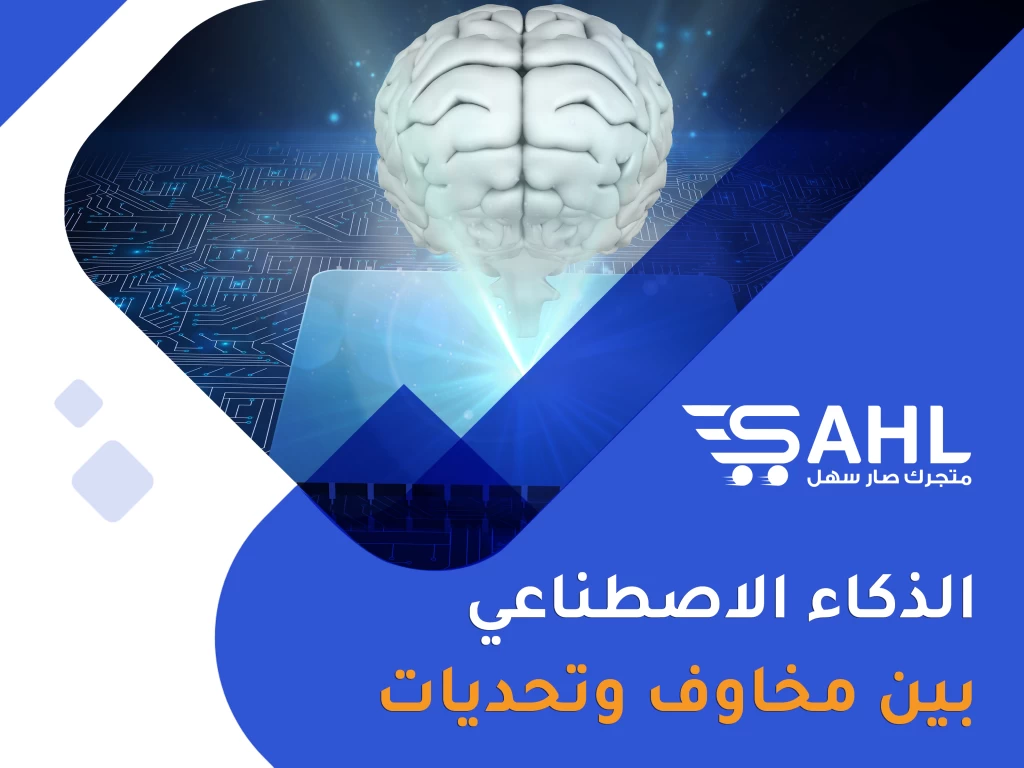Free support 24/7
Free support 24/7

Today the world lives in the era of Artificial Intelligence (AI), where technology has come to play a crucial role in our daily lives. Artificial Intelligence is revolutionary in a variety of industries and has huge potential to improve our lives and increase our productivity. However, we should carefully address the ethical aspects of AI and its challenges for societal safety.
Ethical challenges of artificial intelligence:
Programming Ethical Decisions: AI developers and programming engineers must address important ethical issues in designing systems and algorithms. Such as how to handle personal information and self-control, and whether intelligent systems should have the ability to make vital decisions such as launching smart weapons.
Discrimination and Justice: Discrimination and racism in AI applications must be combated. The data on which intelligent models are trained can be laden with biases and influence the final decisions and actions of systems.
Privacy and Security: Users' privacy and sensitive information must be protected from security breaches. Cyber breaches and data theft pose a major threat on both the personal and collective levels.
Community safety and artificial intelligence:
Robot safety: Robots and intelligent systems have developed rapidly, and therefore measures must be put in place to ensure the safety of society by designing robots capable of avoiding accidents and dealing with unexpected situations.
The impact of artificial intelligence on jobs: The impact of artificial intelligence on the labor market must be studied and workers must be ensured to adapt to these changes. It is important to provide appropriate training and education to ensure everyone benefits from technological advances.
Ethical integrity: Society should be made aware of the ethics of AI and encourage open discussion about the ethical issues associated with it.
Benefiting from artificial intelligence to achieve societal progress
Healthcare: AI can improve disease diagnosis and treatment, as well as provide remote healthcare and reduce health costs.
Education: Artificial intelligence can be applied to develop online education technologies and provide personalized education to each student.
Environment and Energy: Artificial intelligence can be used to improve the management of energy and environmental resources and contribute to combating climate change.
Challenges of applying artificial intelligence in society
Information integrity and cybersecurity: Society should direct its efforts towards enhancing data security and protecting against hacking attacks.
Legislation and Regulations: Laws and regulations must be developed and implemented that regulate the use of artificial intelligence and ensure that it is directed towards ethical goals.
The impact of artificial intelligence on jobs and the economy
Change in jobs: The advancement of artificial intelligence can lead to changes in job structures and consideration must be given to how to prepare workers to meet this transformation.
Digital economy: Artificial intelligence can contribute to the development of a new economy based on technology, and the impact of this on the equitable distribution of wealth must be studied.
Future directions and conclusion
Awareness and Education: Awareness and education about AI ethics must be promoted to the public and technology professionals.
International Cooperation: International cooperation in the field of artificial intelligence must be strengthened to develop international standards that protect community safety and security.
research and development:
Investment in research: Investment in AI research and development must be increased to develop more advanced and ethical technologies.
Sustainable development: Development and progress in the field of artificial intelligence must be sustainable and take into account its impacts on the environment and sustainability.
Leadership and responsibility:
Ethical Leadership: Companies and organizations must be at the forefront of implementing ethical best practices in the development and use of AI technologies.
Social responsibility: Companies and organizations must pay attention to their social responsibility and form partnerships with the local community to ensure that they benefit from artificial intelligence technologies.
Monitoring and surveillance:
Ethical monitoring systems: Effective systems must be established to monitor and control the use of smart technologies in society. Independent bodies can play an important role in ensuring that parties adhere to ethics.
Promote transparency: Companies and organizations must be transparent about how they use AI, and share with society information about the expected impact and potential risks.
Continuous learning:
Learning and Personal Development: Individuals must continue to develop their skills and understanding of AI and its ethics through educational courses and workshops.
Sharing expertise: The scientific community and AI professionals can share their expertise and research so that we can improve our knowledge and understanding of this field.
Future directions:
Innovation and creativity: Innovation and creativity in AI applications that improve people's lives and solve social problems should be encouraged.
Motivation for ethical research: Rewards and support can be offered to researchers and professionals working to develop and promote ethics in the field of artificial intelligence.
Ethics in the design and development of artificial intelligence:
Transparency in training processes: AI developers must be transparent in the sources of data used to train intelligent models and how it was collected. This contributes to avoiding biases and unfairness in the final models.
Documenting ethical decisions: AI developers must document the ethical decisions made during the design and development of systems, and this can include rules of conduct and permitted and prohibited actions.
Continuous evaluation: Developers must continually evaluate the ethical impact of their applications and correct any ethical concerns that arise.
Social and cultural influence:
Change of technical culture: it can lead
Artificial intelligence leads to changes in culture and societies. Consideration must be given to how technology impacts cultural identity and values.
Social context: AI developers must take into account the social and economic challenges that may arise as a result of their applications and work to mitigate negative impacts.
Human rights and ethics:
Privacy and data rights: There must be strict respect for the privacy and personal data rights of individuals. Intelligent systems must be designed to protect these rights.
Non-use for military purposes: The use of smart technology for military purposes must be strictly controlled to prevent negative impact on humans and societies.
Policy and legislation:
Develop ethical laws: Governments and regulatory bodies must develop and implement ethical laws and regulations that govern the use of smart technology and promote responsibility.
International cooperation: International cooperation must be strengthened to develop international standards for ethics in artificial intelligence.
Awareness and education:
Promoting public awareness: Governments and institutions should encourage public awareness about the ethics of AI through awareness and education campaigns.
Training of professionals: Continuous training should be provided to professionals in different fields on the ethics of using smart technologies.
Future research and development:
Public-Private Collaboration: Close collaboration between governments and technology companies should be encouraged to guide research and development towards greater benefits for society and ethics.
Developing advanced technologies to address challenges: More should be invested in researching advanced technologies such as transparent machine learning and social justice to address ethical and social challenges.
Justice and equality:
Ensuring equitable access: It must be ensured that smart technologies are available and affordable to all without discrimination.
Encouraging Diversity and Inclusion: Diversity and inclusion in the technology industry must be promoted by promoting the role of women and minorities in the field of artificial intelligence.
Responding to crises and unexpected situations:
Ethical response training: Extensive training should be provided to AI professionals on how to deal with unexpected situations and ethical crises.
Develop test scenarios: Governments and companies should develop test scenarios to test their response to potential ethical crises.
Innovation and future thinking:
Embedded ethical thinking: Ethical thinking should be embedded as an integral part of innovation and technology design processes.
Motivation for ethical research: Grants and rewards can be offered to researchers and professionals working to develop and promote ethics in the field of artificial intelligence.
Communication and community participation:
Community participation in decisions: Businesses and governments must enable local communities and beneficiaries to participate in decision-making processes around the use of smart technologies.
Provide channels for complaints and suggestions: Effective channels should be provided for the public to report ethical concerns and make suggestions for improving techniques.
Responding to future challenges:
Ethical control of advanced artificial intelligence: As technology advances and fields such as advanced artificial intelligence and deep learning emerge, society must develop methods for ethical control and oversight to ensure that this technology is used safely and responsibly.
Ethics in genes and gene editing: The development of technology also includes gene editing and genetic scanning, and ethical standards must be established to ensure that these technologies are used safely and in ways that preserve human dignity.
Research and development of ethical solutions:
Research into ethical AI: Increased investment in research aimed at developing AI technologies that are ethical from the start.
Innovation in ethical inspection techniques: Self-inspection techniques can be developed for smart models to verify that they behave in accordance with ethical principles.
International role and international cooperation:
Developing international standards: International cooperation should be encouraged to develop strong international standards that regulate the ethical and safe use of smart technology on a global level.
Participation of developing countries: Developing countries must be enabled to participate effectively in developing and guiding ethics in the field of artificial intelligence and future technology.
Transparency and monitoring:
Sharing ethical information: Companies and governments should share public ethical information about the design and use of AI technologies.
Developing continuous monitoring systems: Continuous monitoring systems can be developed to monitor and evaluate the effects of smart technologies on society and the environment.
Avoid harmful uses:
Preventing harmful military uses: The international community must work to develop international agreements that prevent the use of smart technology for military purposes that lead to negative effects.
Incentivizing the move away from risky technologies: Incentives can be provided to companies and researchers to move away from developing technologies that have significant harmful risks.
Conclusion:
AI ethics is a responsibility that requires sustained effort and strategic thinking to ensure society benefits from the technology safely and responsibly. These ethics must be at the heart of design, development and use to ensure that social and economic progress is achieved in a sustainable and equitable manner. Commitment to ethics enhances community safety and strikes an important balance between technology and ethics.

الذكاء الاصطناعي كان يُعتبر حكر على الشركات الكبيرة لكن اليوم صار أداة متاحة حتى للمتاجر الصغيرة

روبوتات المحادثة انتشرت بشكل كبير في المتاجر الإلكترونية والتطبيقات لكن كثير يتساءل هل فعلًا ترفع المبيعات أو هي مجرد ترند
You can create your store easily